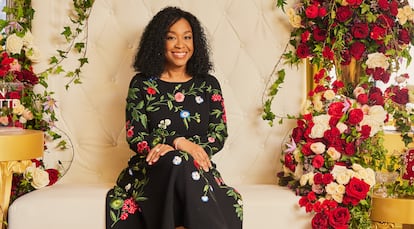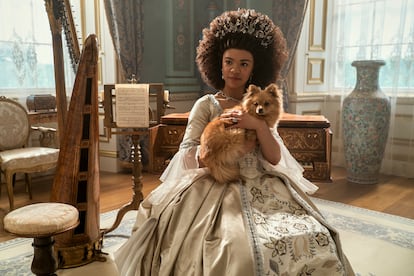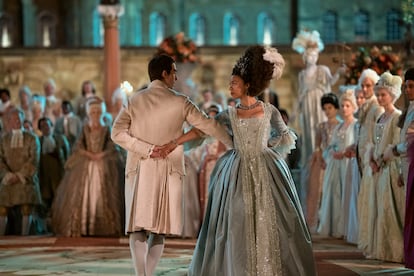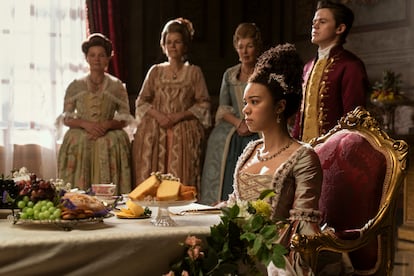Shonda Rhimes: ‘I was raised to believe that I had power and it was to be utilized’
The producer and screenwriter’s new series traveled to the past of Queen Charlotte from the hit ‘Bridgerton’. Known for her strong female characters, she says, ‘I don’t know any weak women, so why would I be writing about that?’

Shonda Rhimes says that, when she started in the screenwriting world, she had no doubts that her objective was to rule the world through television. It could be said that the producer and screenwriter has done it, and she has done so with entertainment. The first series she created was Grey’s Anatomy, now an institution that continues releasing new episodes. Rhimes brings hope for a more egalitarian society where race and gender are not an obstacle to power. Her production company, Shondaland, has given us Black anti-heroines like Scandal’s Olivia Pope and How To Get Away With Murder’s Annalise Keating. And skin color is not a problem in the circles of British high society that Bridgerton explores.
In her new series, Queen Charlotte: A Bridgerton Story, which Netflix releases on May 4, she travels to the past of one of the platform’s most popular shows to tell the story of a colorful character. The character does not exist in the novels that inspired the show, but Rhimes’ Queen Charlotte — with her impossible hairstyles, a haughty attitude and a nosy personality — is now the protagonist of her own miniseries. The story follows the young woman’s arrival at court to marry King George III, and, at the same time, turn upside down the classist and racist environment of Georgian England. “To me, Queen Charlotte is like the Beyoncé of her day. She’s so glamorous, she’s so interesting, and I wanted to see how she came to be that way,” Rhimes said in a video interview with EL PAÍS in early April.
Though there was a real Queen Charlotte and King George III, the series makes clear from the beginning its distance from reality. A disclaimer at the beginning of the show reads, “This is the story of Queen Charlotte from Bridgerton. It is not a history lesson — it is fiction inspired by fact. All liberties taken by the author are quite intentional.”
The real Queen Charlotte was born in Germany, and some historians indicate that she had North African roots. She married George III only three hours after meeting him in 1761. “It’s not the real story of the actual Queen Charlotte, although I did a lot of research so that we knew when we were diverging from that.” Rhimes drew on George III’s fondness for agriculture and astronomy. She was surprised that Queen Charlotte had 15 children: “I don’t think I really understood what that would mean for a woman giving birth. That was pretty impressive,” the writer said. She also emphasized the queen’s philanthropy, which is reflected in her incentivizing the construction of hospitals and homes for single mothers.

Her Queen Charlotte joins Shondaland’s other strong female protagonists. “Everybody always asks me, why do you create strong women? And the answer to that is, I don’t know any weak women, so why would I be writing about that? It doesn’t feel real to me. It’s some fantasy that somebody came up with that there are weak women.” When asked about the difficulties women face to be heard in positions of power, Rhimes is direct: “It doesn’t exist like that in Shondaland. We joke that we’re a matriarchy over here.”
Question. Race plays a fundamental role in your shows, even when it’s not explicit. Charlotte’s arrival at court is a revolution. What importance do you give to diversity and racial representation in your shows? Why is it important for you to continue delving into these topics?
Answer. It’s not so much something that I consciously think is super important. It’s just that I’m never going to create a show that I can’t see myself in that doesn’t make sense to me. And I know the world is full of different kinds of people, and I want my shows to be full of different kinds of people.
Q. Have you ever had trouble being heard?
A. I had the great fortune to write Grey’s Anatomy as my very first job in television. So I was afforded a luxury that not a lot of women were, which is that with success comes a decision to really listen to the voice of the show creator. And so I didn’t have that problem. But I know a lot of women do now.
Q. You have said that Queen Charlotte asks how to survive a world in which you have no power. Have you ever felt that?
A. I don’t think I ever felt that way. I’m very lucky that I grew up feeling very empowered.
Q. Never? Not even when you got started?
A. That’s how I was raised. I was raised to have great parents, and I was raised to believe that I had power, as big or small as it was. It was there and it was to be utilized. That’s something that I want a lot of women to get the opportunity to feel. In Queen Charlotte, you watch young Charlotte learn her power. That’s a really powerful thing to watch.

Shonda Rhimes’ series are characterized by their entertaining, addictive plots full of twists. The screenwriter says her goal is to entertain, not educate or offer social or political messages. For years, her entertainment appeared on public television. Now, Rhimes has a multimillion-dollar contract to produce exclusive series for Netflix. The change has altered the length of her stories: the 22 or 24-episode television seasons have been replaced by miniseries or shorter seasons. Queen Charlotte has six episodes; Inventing Anna had nine and each season of Bridgerton has eight. Does she miss the longer runs, or is she grateful that miniseries are having a moment? Rhimes laughed out loud at the question. “I loved writing network television shows. I loved the pace. I loved how much story you could tell in the season. But the schedule is a really brutal schedule. That’s a new episode every eight days.”
As the show runner, she has supervised all the departments involved in developing the Queen Charlotte universe, from wardrobe, hair and makeup and locations to casting. But despite all the work that show running involves, Rhimes describes herself as a screenwriter above all else. “The biggest challenge is always writing. With this show, I had to write all the episodes as we were shooting, which I’m used to, but they move at a little bit of a faster pace. I feel very, very critical of myself and I always want to make sure that the writing is exactly where it needs to be. As a showrunner, I’m really lucky. I’m surrounded by incredible, amazing people, and I really believe in letting people do their jobs.”

Q. How do you manage success? Has it changed your life?
A. I definitely think success changes your life in many, many ways. For me, a lot of it was figuring out how to get into a space where I was living a life, where I was making time for myself. That took a while.
Q. Have your ambitions and goals changed with your success?
A. My biggest goal in terms of work is to always tell great stories. So my ambition has not changed in that sense. My goals for the next year are to really work on getting Queen Charlotte out to the public and getting the next Bridgerton ready. I think that those are enough. The biggest thing I’m going to do after we finish Queen Charlotte is take a little bit of time off to really think about what stories I want to tell.
Q. Do you have free time?
A. I really learned how to make sure that I have the creative space I need to write. So, yes, I have free time.
Sign up for our weekly newsletter to get more English-language news coverage from EL PAÍS USA Edition
Tu suscripción se está usando en otro dispositivo
¿Quieres añadir otro usuario a tu suscripción?
Si continúas leyendo en este dispositivo, no se podrá leer en el otro.
FlechaTu suscripción se está usando en otro dispositivo y solo puedes acceder a EL PAÍS desde un dispositivo a la vez.
Si quieres compartir tu cuenta, cambia tu suscripción a la modalidad Premium, así podrás añadir otro usuario. Cada uno accederá con su propia cuenta de email, lo que os permitirá personalizar vuestra experiencia en EL PAÍS.
¿Tienes una suscripción de empresa? Accede aquí para contratar más cuentas.
En el caso de no saber quién está usando tu cuenta, te recomendamos cambiar tu contraseña aquí.
Si decides continuar compartiendo tu cuenta, este mensaje se mostrará en tu dispositivo y en el de la otra persona que está usando tu cuenta de forma indefinida, afectando a tu experiencia de lectura. Puedes consultar aquí los términos y condiciones de la suscripción digital.









































